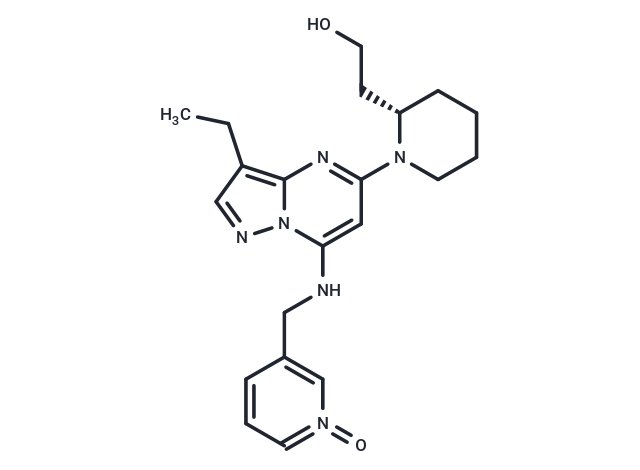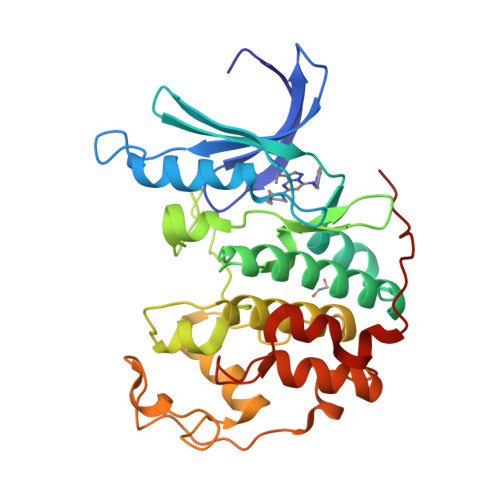 您的购物车当前为空
您的购物车当前为空
Dinaciclib
一键复制产品信息别名 SCH 727965, PS-095760
Dinaciclib (SCH 727965) 是一种 CDK 抑制剂,抑制 CDK1、CDK2、CDK5 和 CDK9 (IC50=3/1/1/4 nM),具有选择性。Dinaciclib 具有潜在的抗肿瘤活性,可以抑制胸甘 (dThd) DNA 的整合。


为众多的药物研发团队赋能,
让新药发现更简单!
Dinaciclib
一键复制产品信息Dinaciclib (SCH 727965) 是一种 CDK 抑制剂,抑制 CDK1、CDK2、CDK5 和 CDK9 (IC50=3/1/1/4 nM),具有选择性。Dinaciclib 具有潜在的抗肿瘤活性,可以抑制胸甘 (dThd) DNA 的整合。
| 规格 | 价格 | 库存 | 数量 |
|---|---|---|---|
| 2 mg | ¥ 498 | 现货 | |
| 5 mg | ¥ 797 | 现货 | |
| 10 mg | ¥ 1,240 | 现货 | |
| 50 mg | ¥ 3,781 | 现货 | |
| 1 mL x 10 mM (in DMSO) | ¥ 877 | 现货 |
Dinaciclib 相关产品
产品介绍
| 产品描述 | Dinaciclib (SCH 727965) is a CDK inhibitor that selectively inhibits CDK1, CDK2, CDK5, and CDK9 (IC50 = 3/1/1/4 nM). Dinaciclib has potential antitumor activity and inhibits the incorporation of thoracic glycan (dThd) DNA. |
| 靶点活性 | CDK1:3 nM (cell free), CDK2:1 nM (cell free), CDK9:4 nM (cell free), CDK5:1 nM (cell free) |
| 体外活性 | 方法:人胰腺癌细胞系 MIAPaCa-2 和 Pa20C 用 Dinaciclib (0.5-128 nM) 处理 72 h,使用 MTT Assay 检测细胞活力。 |
| 体内活性 | 方法:为检测体内抗肿瘤活性,将 Dinaciclib (40 mg/kg,20% (w/v) HPBCD) 腹腔注射给携带人胰腺癌肿瘤 JH033 或 Panc286 的 CD1 nu/nu athymic 小鼠,每周两次,持续四周。 |
| 激酶实验 | Recombinant cyclin/CDK holoenzymes were purified from Sf9 cells engineered to produce baculoviruses that express a specific cyclin or CDK. Cyclin/CDK complexes were typically diluted to a final concentration of 50 μg/mL in a kinase reaction buffer containing 50 mmol/L Tris-HCl (pH 8.0), 10 mmol/L MgCl2, 1 mmol/L DTT, and 0.1 mmol/L sodium orthovanadate. For each kinase reaction, 1 μg of enzyme and 20 μL of a 2-μmol/L substrate solution (a biotinylated peptide derived from histone H1) were mixed and combined with 10 μL of diluted SCH 727965. The reaction was started by the addition of 50 μL of 2 μmol/L ATP and 0.1 μCi of 33P-ATP. Kinase reactions were incubated for 1 hour at room temperature and were stopped by the addition of 0.1% Triton X-100, 1 mmol/L ATP, 5 mmol/L EDTA, and 5 mg/mL streptavidin-coated SPA beads. SPA beads were captured using a 96-well GF/B filter plate and a Filtermate universal harvester. Beads were washed twice with 2 mol/L NaCl and twice with 2 mol/L NaCl containing 1% phosphoric acid. The signal was then assayed using a TopCount 96-well liquid scintillation counter. Dose-response curves were generated from duplicate, eight-point serial dilutions of inhibitory compounds. IC50 values were derived by nonlinear regression analysis [1]. |
| 细胞实验 | A2780 cells were plated into six-well tissue culture dishes and allowed to adhere. Cells were then exposed to differing concentrations of SCH 727965 or a DMSO control vehicle for 24 hours, followed by a brief (30 min) pulsed exposure to bromodeoxyuridine (BrdUrd). Cells were then harvested, immunostained using FITC-conjugated antibodies specific for BrdUrd, counter-stained with propidium iodide/RNase A solution, and analyzed using flow cytometry. Fluorescence-activated cell sorting analyses were done on a FACSCalibur instrument. FITC-positive BrdUrd staining and propidium iodide signal allowed assessment of ongoing DNA replication and the cell cycle stage. Percentages of the cell population in each cell cycle stage were plotted for each test article concentration [1]. |
| 动物实验 | For tumor implantation, specific cell lines were grown in vitro, washed once with PBS, and resuspended in 50% Matrigel in PBS to a final concentration of 4 × 10^7 to 5 × 10^7 cells per milliliter. Nude mice were injected with 0.1 mL of this suspension s.c. in the flank region. Tumor length (L), width (W), and height (H) were measured by a caliper twice weekly on each mouse and then used to calculate tumor volume using the formula (L × W × H)/2. When the tumor volume reached ~100 mm^3, the animals were randomized to treatment groups (10 mice/group) and treated i.p. with either SCH 727965 or individual chemotherapeutic agents according to the dosing schedule indicated in table and figure legends. Tumor volumes and body weights were measured during and after the treatment periods. Data were expressed as means ± SEM. Animals were euthanized according to the Institutional Animal Care and Use Committee guidelines [1]. |
| 别名 | SCH 727965, PS-095760 |
| 分子量 | 396.49 |
| 分子式 | C21H28N6O2 |
| CAS No. | 779353-01-4 |
| Smiles | N(CC1=CN(=O)=CC=C1)C=2N3C(N=C(C2)N4[C@H](CCO)CCCC4)=C(CC)C=N3 |
| 密度 | 1.33 g/cm3 |
| 颜色 | Yellow |
| 物理性状 | Solid |
| 存储 | Powder: -20°C for 3 years | In solvent: -80°C for 1 year | Shipping with blue ice/Shipping at ambient temperature. | ||||||||||||||||||||||||||||||||||||||||
| 溶解度信息 | DMSO: 130 mg/mL (327.88 mM), Sonication is recommended. Ethanol: 8 mg/mL (20.18 mM), Heating is recommended. | ||||||||||||||||||||||||||||||||||||||||
| 体内实验配方 | 10% DMSO+40% PEG300+5% Tween 80+45% Saline: 5 mg/mL (12.61 mM), Solution. 请按顺序添加溶剂,在添加下一种溶剂之前,尽可能使溶液澄清。如有必要,可通过加热、超声、涡旋处理进行溶解。工作液建议现配现用。以上配方仅供参考,体内配方并不是绝对的,请根据不同情况进行调整。 | ||||||||||||||||||||||||||||||||||||||||
溶液配制表 | |||||||||||||||||||||||||||||||||||||||||
Ethanol/DMSO
DMSO
| |||||||||||||||||||||||||||||||||||||||||
化合物与蛋白结合的复合物

BRDT in complex with Dinaciclib




 很棒
很棒

 |
|
评论内容